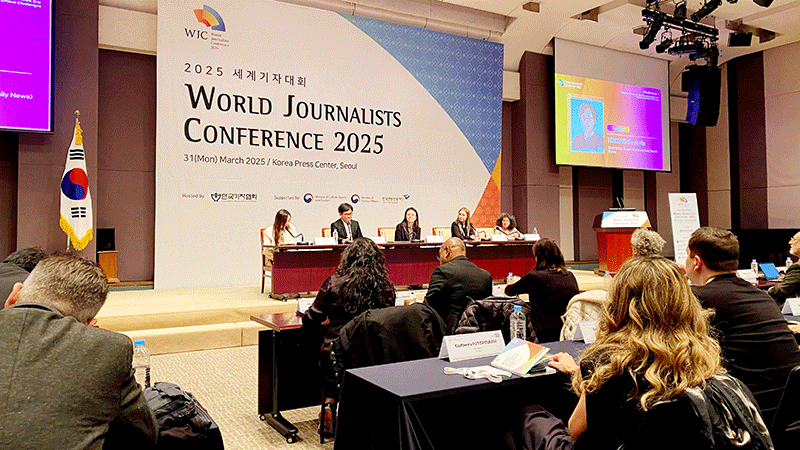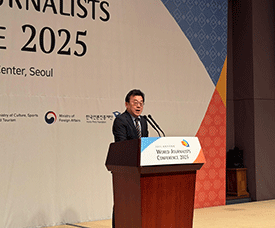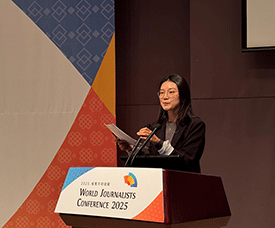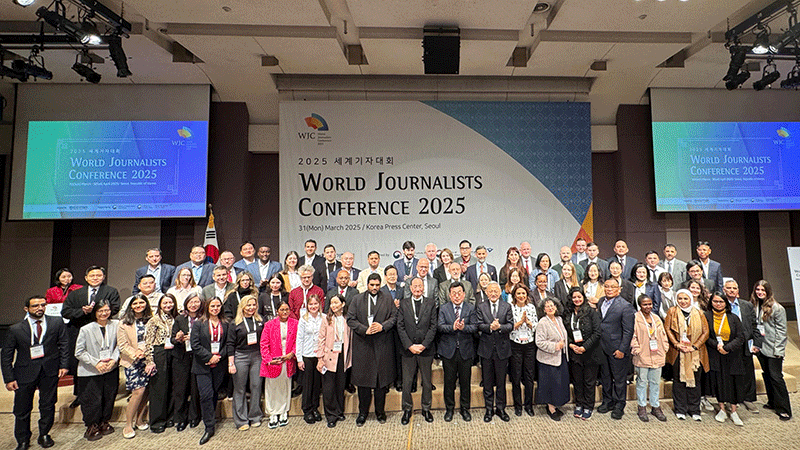 |
| Panellists and participants at the World Journalist Conference 2025. |
World Journalists Conference debates AI’s impact on the media
The World Journalists Conference 2025 is hosted by the Journalists Association of Korea (JAK), led by its President Mr Park Jong Hyun, with support from South Korea’s Ministry of Culture, Sports and Tourism, Ministry of Foreign Affairs, and the Korea Press Foundation.
A total of 62 journalists attended the event, which explored AI’s influence on journalism and the role of the media in addressing climate change.
 |
 |
In his opening remarks, Park Jong-hyun said “I hope this conference reaffirms the fundamental mission of journalism and strengthens solidarity among media professionals worldwide.”
He added that the association is committed to fostering meaningful dialogue and ensuring that discussions are insightful for all participants.
The Journalists Association of Korea, founded in 1964, is marking its 61st anniversary this year.
Since 2013, the World Journalists Conference has brought media professionals together to discuss global issues, fostering collaboration and professional networks.
This year, the first session, titled “Shaping the Future of Journalism in the AI Media Era: Copyright and Ethical Challenges,” featured speakers including a writer from the Busan Daily News, Mr Hwang Seok-ha, a journalist from the China Daily, Mrs Yin Cao, a journalist from Business Insider Poland, Mrs Natalia Szewczak, and the Executive Director of Investigative Reporters and Editors in the United States, Mrs Diana Fuente.
 |
The session was moderated by the Managing Editor of the Korea Herald, Lee Jo Hee.
The discussion delved into AI’s dual impact on journalism, with speakers highlighting its ability to enhance efficiency while also raising serious ethical and legal concerns.
Mrs Yin Cao highlighted both its potential to aid in tasks like data analysis and the ethical challenges it presents, such as the spread of misinformation and copyright issues.
“AI is changing how we do journalism. It can make us more efficient, but it also brings risks. We need to use AI wisely, check our facts more carefully, and protect people’s rights with more effort,” she said.
Mrs Yin Cao noted that AI can generate drafts and suggest headlines but warned of issues related to copyright infringement, as AI systems often scrape large amounts of data, including copyrighted content, for training.
“Addressing the double-edged sword of AI in news writing, AI can be a huge help. It can write drafts, suggest headlines, But AI poses significant challenges to news copyright,” she said.
Mrs Natalia Szewczak stressed the importance of human oversight, arguing that AI should support rather than replace journalists.
“AI could not do what investigative journalists do. It cannot question absurdities in laws or push for positive change,” she said.
“Properly used AI tools clearly have the ability to significantly shorten the time it takes to do data processing, giving journalists more time to do creative work. What is produced by the tools needs to be verified, but it can be a time-saver,” she added.
The ethical use of AI in journalism was another key focus, with Hwang Seok-ha discussing AI policies that stress transparency and the need to disclose AI-generated content to readers.
He also raised concerns about AI bias and the necessity of rigorous fact-checking, saying “ChatGPT, for instance, can sometimes produce misleading or entirely false information, a phenomenon known as hallucination.”
The debate also touched on the dangers of AI-generated misinformation and deep fakes. Yin Cao warned of AI’s potential to create and spread deceptive content, making it difficult for the public to distinguish between real and fake news.
Mrs Szewczak echoed these concerns, highlighting the risks of AI-generated deep fake videos and images that can manipulate public perception.
Looking to the future, speakers offered mixed perspectives on AI’s role in journalism. Yin Cao argued that journalists who effectively use AI will thrive, saying “What will be replaced are journalists who fail to use AI effectively… If used sensibly, AI can enhance journalism and make us better reporters.”
Mrs Fuentes shared a similar view, suggesting that AI can free journalists to focus on creative and investigative work.
The conference also addressed climate change in a second session titled “The Role of Journalism in Confronting Climate Change and Environmental Shifts”.
Speakers included the Senior Defence and Foreign Policy Correspondent of the Canadian Broadcasting Corporation, Mr Murray Brewster, Senior News Editor of NBC Ethiopia TV, Mr Tregahun Asefa Shimekit, Global Desk Chief of Italy’s Agenzia Nova, MrGianmarco Volpe, and the Director of Korea’s NEXT Group, Mrs Yun Ji Ro.
The session was moderated by Park Sang Woo of JTBC in South Korea.
The event provided a platform for journalists to exchange ideas on AI’s impact on media, ensuring the press continues to uphold ethical standards and public trust in the digital era.
By Phonepaseuth Volakhoun
(Latest Update April 8, 2025) |